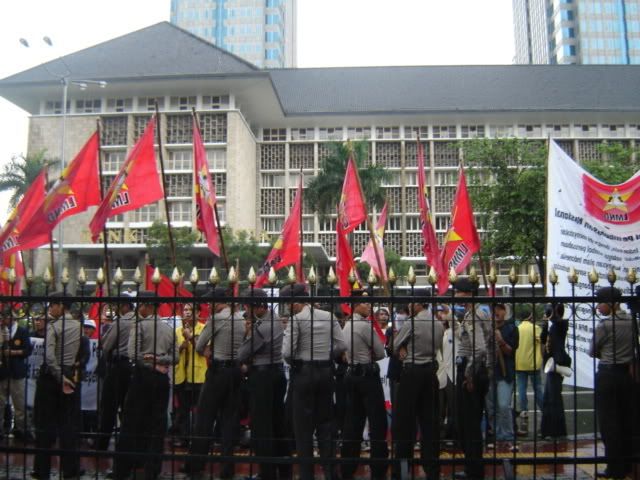Students press demands for nationalization of mining sector and for free education
5:32 AM Posted by National Liberation Party Of Unity (PAPERNAS)
The National Students' League for Democracy (LMND) held an action at the office of Exxon-Mobil in
The statement also condemns the government of Susilo Bambang Yudhoyono
and Jusuf Kalla as not having the courage 'to do what LMND is doing now', as 'they are only the foremen of foreign capital, not having any perspective for the independence of the nation'. LMND pledges that while now they focused on ExxonMobil, 'next we would occupy their friends also such as Chevron, Newmont,
This campaign is designed to, according to LMND, provide the understanding to the people about 'who our real oppressors are, who should inherit the natural riches of the country and how to confront the oppressors'. This action was taken as part of mobilizing around the Three Banners of the People (Tripanji) of the Papernas (National United Liberation Party), which LMND helped initiate. With, according to Papernas, 92% of the Indonesian mining sector controlled by foreign capital, the most lucrative sector of the economy barely benefits the people. The imperialist domination of
The action against Exxon-Mobil represents a ratcheting up of mobilizations around the country on the issue of nationalization of the mining sector, among others in the lead up to the 2009 elections. The demands of the action are also designed to demonstrate alternative, pro-poor policies that are presented by Papernas, of which LMND and other groups are a part. While continuing preparations to contest the elections, in the context of onerous government requirements on party registration in order to be able to participate, Papernas is also mobilizing on its key demands, as well as continuing to respond to- and campaign on urban poor and workers' issues. Political parties intending to contest the 2009 general elections are from February 27 occupied with the 'verification' process, a government process to verify whether parties have met certain requirements, such as having leadership structures in 60% of provinces, 50% of
districts and 20% of subdistricts, in order to contest the elections. (** Vannesa Herman)




0 comments:
Post a Comment